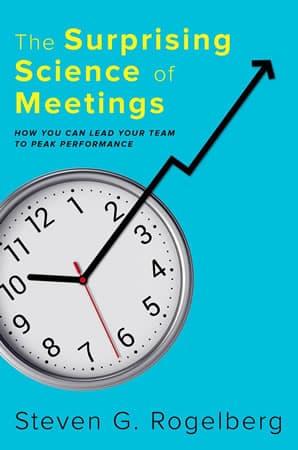Use science to conduct better meetings: Professor’s new book available

Most meetings end with attendees wondering what was accomplished. In 2019, leaders everywhere or pretty much anyone who interacts with others should resolve to read “The Surprising Science of Meetings” by UNC Charlotte’s Steven Rogelberg. The Washington Post recently listed it No. 1 for leadership books to watch for in 2019.
Rogelberg, who is an organizational science professor at UNC Charlotte, is an internationally recognized researcher on the subject of meetings, and he maintains there is hope for successful meetings. He has distilled his comprehensive research into wide-ranging practical strategies for anyone running a meeting in his new book, “The Surprising Science of Meetings,” available Jan. 2 via Oxford University Press.
“There are approximately 55 million meetings a day in the U.S. alone. Frustration and complaints abound. Most companies and leaders view poor meetings as an inevitable cost of doing business. I saw this as an incredible opportunity, and I was motivated to help solve the meeting problem through strong science and the discovery of evidence-based solutions,” Rogelberg said.
 In his book, Rogelberg draws from extensive research, analytics and survey interviews with more than 5,000 employees across a range of industries and around the globe to share proven practices and techniques that help managers and employees enhance the quality of their meetings.
In his book, Rogelberg draws from extensive research, analytics and survey interviews with more than 5,000 employees across a range of industries and around the globe to share proven practices and techniques that help managers and employees enhance the quality of their meetings.
“My hope is that people start trying new things to truly improve the current state of meetings,” Rogelberg said. “While we can’t control another person’s meeting, we can control our own. We can model excellent practices and be an example to others. This book helps people make strong and grounded decisions that elevate meeting effectiveness, engagement, innovation and inclusion. Given the incredible amount of time spent in meetings, what is exciting is that even if we only make 20 percent of meetings 20 percent better, the cascading positive impact is tremendous.”
For those who lead and participate in meetings, Rogelberg provides immediate direction, guidance and hope. Among his top tips for meeting leaders (with more detail about strategies in the book):
- Lead meetings with a steward mindset
- Invite the smallest number of people possible to a meeting for the best engagement but actively engage secondary attendees
- Remember Parkinson’s Law: Work expands to fill the time available for its completion; plan for the shortest time reasonable. Apply a little pressure for optimal performance
- Provide a strategic agenda “owned” by all, framed by questions if possible
- Start meetings as a host
- Be unconventional at times with location, food and interactivity elements, like quizzes or written prompts
- Leverage alternative meeting formats, such as huddles
- Own the success of the meetings; evaluate them periodically
Rogelberg has consulted with some of the world’s most successful companies on a range of workplace issues, and he has been uncovering clues about meetings for more than 15 years. His research has been published in top journals, including the Journal of Applied Psychology. Doctoral students advised by Rogelberg have gone on to become leader scholars, many also studying meetings.
“I love finding the sweet spot between basic academic advancement and practical importance. Meetings became a target for me in my own research, and what has followed has been a mini tsunami in this important area,” stated Rogelberg. He adds lessons from his research in his undergraduate classes and MBA teachings and consults with organizations globally to create change.
“The Surprising Science of Meetings” is already gaining attention—from business leaders like Janine Waclawski of PepsiCo and scholars like Adam Grant of the Wharton School. Small organizations and firms, to large global companies like Cisco and major health care organizations, have invited Rogelberg to speak on the topic of meetings. Yet, for those thinking the book is all business, Rogelberg said meetings are more pervasive than one may think—at work, in the community, even with family members.
“This book is for anyone who ever leads a meeting—that’s pretty much everyone,” said Rogelberg.
In 2018, Rogelberg received the Humboldt Prize, also known as the Humboldt Research Award, in recognition of his profound, international impact on organizational science, including his scholarly work on the practical topic of meetings. Also, in recognition of humanitarian contributions to the field of industrial-organizational psychology, Rogelberg was named the inaugural recipient of the Society of Industrial and Organizational Psychology Humanitarian Award in 2017.
During his academic career, Rogelberg has received numerous awards. In 2013, he was named the inaugural recipient of the Chancellor’s Professor (formerly University Professor), a campus-wide recognition of outstanding contributions primarily in a specific discipline but exhibiting an interdisciplinary character enabling contributions in more than one department or college.
Rogelberg completed a master’s degree and doctoral degree in industrial/organizational psychology from the University of Connecticut. His undergraduate degree in psychology is from Tufts University.
Find out more about Rogelberg and the book online: https://pages.uncc.edu/steven-rogelberg/the-surprising-science-of-meetings/
Purchase the book on Amazon: https://www.amazon.com/Surprising-Science-Meetings-Lead-Performance/dp/0190689218/
Sign up for Rogelberg’s ExEd session on Feb. 20: https://exed.uncc.edu/events/2019-02-20/surprising-science-meetings
UNC Charlotte media contacts:
Kirsten Khire, Belk College of Business
704-687-7601 | 704-885-4131 | kkhire@uncc.edu
Buffie Stephens, External Media Relations Director
704-687-5830 | 980-355-3110 | buffiestephens@uncc.edu
Jason Vaughan, Media Relations Manager
704-687-1750 | 330-421-5094 | jason.vaughan@uncc.edu